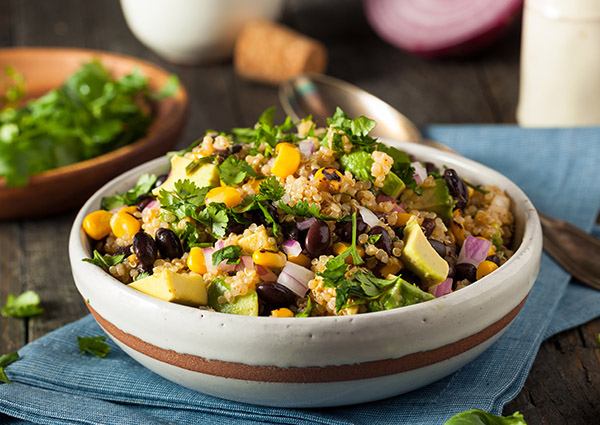
The Power of Plant Based Protein
In the past, high protein diets typically meant meals based around meat, eggs, and dairy foods. These animal products have always been top of mind because they are excellent sources of protein. However, they are not the only sources of this valuable nutrient. In recent years, an interest in plant-based protein sources has surged. Plant foods such as beans, legumes, nuts, seeds and some grains have proven to be easy-to-prepare, economical options for meeting protein needs.
There are various reasons why consumers are opting for plant-based foods, ranging from the environmental and ethical implications of eating meat to the personal health concerns and the recognized health benefits of plant foods. Studies indicate that it costs more to produce meat and dairy than it does to grow vegetables and grains, and meat production depletes environmental resources at a greater rate. In addition, individuals worried about animal cruelty often choose a vegetarian or vegan lifestyle, and individuals with dairy allergies or lactose intolerance also seek plant-based alternatives. The lower cost and simplicity of preparing plant foods adds to their popularity.
Dietitians are applauding this dietary shift, as research consistently shows that plant foods have a host of health benefits. Protein is an excellent nutrient for maintaining muscle and keeping appetite in check. When protein comes from plant foods, it instills greater benefits including better cardiovascular health through improved cholesterol levels and lower blood pressure, decreased cancer risks, and promotion of a healthy weight through accompanying fiber and fewer calories per serving.
You don’t need fancy products to incorporate plant proteins into your diet. Most plant foods are ready to eat and require little-to-no preparation including seeds, nuts and canned beans. All of these foods can be added to soups, stir-fries or salads to increase the nutrient content while making them more filling. The following easy recipes and tips will help you incorporate a variety of plant-based proteins into your diet.
- Beans – Rinse canned beans and combine with cooked brown rice, corn, green onions and salsa. Beans are inexpensive and a great source of iron, making them an ideal replacement for meat.
- Soy Foods – Marinate tofu in soy sauce and garlic and then stir-fry with vegetables and rice, or simply boil edamame for an easy snack.
- Legumes – A classic peanut butter and banana sandwich on whole grain bread is an easy, protein-rich meal.
- Nuts – Nuts such as almonds, walnuts, hazelnuts or pistachios are delicious on their own or when combined with dried fruit as a trail mix.
- Seeds – Pumpkin and sunflower seeds are perfect for snacking or as a topping for cereal. Quinoa is a protein-rich alternative to rice or pasta. Hemp and chia seeds boost the nutrition of a smoothie.
- Protein Powder – Plant-based protein powders make an excellent base for a fruit smoothie.





